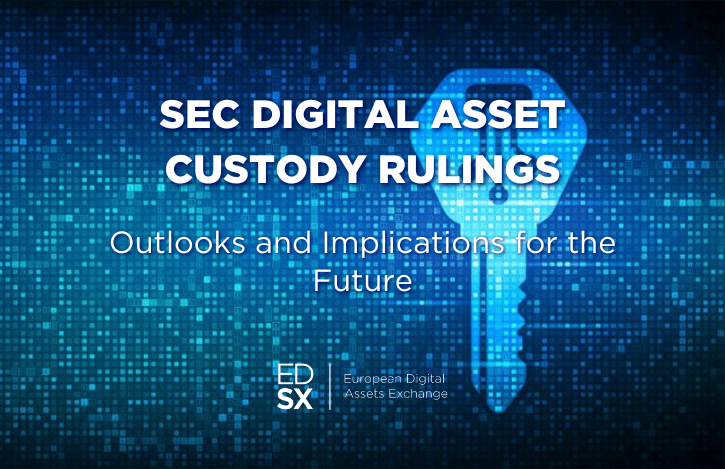SEC Revamps Digital Asset Custody Rules After Regulatory Failures
Earlier this year, the SEC proposed stricter rules for digital asset custody like cryptocurrencies following high-profile exchange bankruptcies that left consumers’ funds unprotected. However, a recent legal loss for the SEC and Nasdaq backing out of crypto custody could pave the way for more investor options.
Spurred by collapses at platforms like Celsius and FTX, the SEC voted to expand its “custody rule” for registered investment advisors (RIAs). The rule currently requires advisors to place traditional client assets like stocks with qualified custodians like banks or broker-dealers. The SEC’s amendment would also apply this to crypto and other digital holdings.
The goal is to prevent a repeat of cases where exchange failures revealed consumer funds were commingled with company assets rather than kept separate. SEC Chair Gary Gensler said it provides the same protections for crypto holdings as traditional investments.
Nasdaq Backs Out of Crypto Custody Plans
Adding to regulatory concerns, Nasdaq recently canceled plans to launch a cryptocurrency custody service, citing “the shifting business and regulatory environment in the United States.” Nasdaq had intended to establish a special purpose trust in New York but withdrew due to unclear regulations.
This comes despite renewed optimism from proposals like BlackRock’s spot bitcoin ETF, which Nasdaq could still potentially list if approved. Nasdaq’s move reflects growing scrutiny of crypto custody as the SEC proposes separating these services from trading platforms.
A Positive Development from the Greyscale Lawsuit
However, despite the restrictive SEC ruling, the crypto industry has achieved victory. A recent court decision forces the SEC to reconsider its past denials of Bitcoin ETF applications like Grayscale’s. The SEC had rejected Grayscale’s application to convert its Bitcoin trust into an ETF, claiming fraud concerns unique from approved futures-based funds tracking the same spot market prices.
However, the appeals court ruled the SEC failed to demonstrate Grayscale’s material dissimilarity or explain differing treatment of comparable products. While not mandating approval, the decision means the SEC must reevaluate Grayscale’s proposal with valid rationale.
This legal setback signals a potential regulatory attitude shift. It challenges the SEC’s historical resistance to listed spot-market bitcoin investments that could drive greater institutional adoption once approved. The decision restores hope a U.S. Bitcoin ETF providing traditional security may launch.
Positive Ramifications for Digital Assets Custody
The Grayscale outcome carries broader implications beyond one firm’s chances at an ETF. It could ease future listings and handling of crypto assets within traditional investment vehicles subject to strict oversight.
With regulatory-grade security and easier access for mainstream investors, ETFs may help accelerate the institutionalization progress begun by companies now piloting digital asset prime brokerage together with similar institutional-grade custody solutions.
Greater participation from risk-averse allocators depends on robust investor protection comparable to traditional holdings. Options like insured ETFs administered through trusts address these needs.
By forcing reevaluation, the court decision marks an encouraging step toward recognizing digital assets deserve treatment aligning with true characteristics, not fears of inherent risk alone. A maturing regulatory framework accounts for innovation responsibly managed.
Outlook
As digital asset adoption grows, qualified custody supporting institutional use cases will remain a focus. The SEC’s actions aim to learn from past failures while the legal win for Grayscale pushes open-mindedness.
With increasing clarity around balancing oversight and innovation, prospects brighten for strengthened consumer protections coexisting with options for exposure through familiar vehicles like ETFs. For investors, developments on this regulatory front shape prospects for the long-term viability and orderly evolution of the crypto space.

Based in Zug, the platform is fully compliant with all Swiss laws related to financial intermediaries, banking, anti-money laundering, and organized trading facilities. Among its core values, there are innovative solutions through blockchain technology, which ensures security and liquidity.
EDSX is the first platform in Europe with primary and secondary markets for both institutional and retails. EDSX is a pioneering platform that employs the world’s leading technology to globally list security tokens in both primary and secondary markets, listing digital securities of real financial instruments to the public with a decentralized peer-to-peer exchange. Our goal is to fully engage every aspect of the financial revolution.
Do you have a question for us?
Send your query here:
[email protected]

